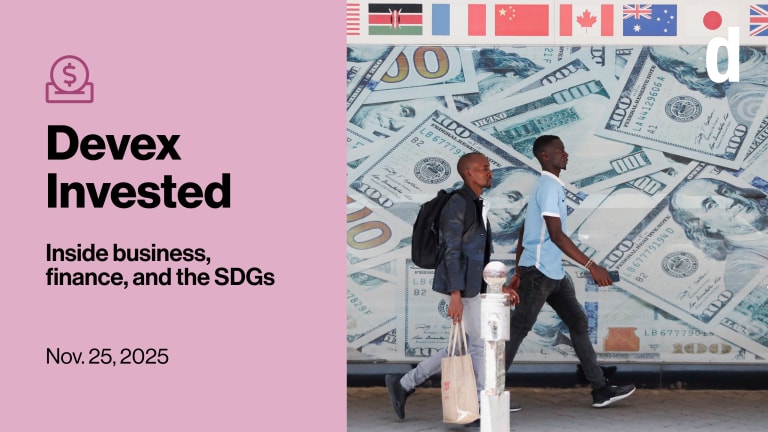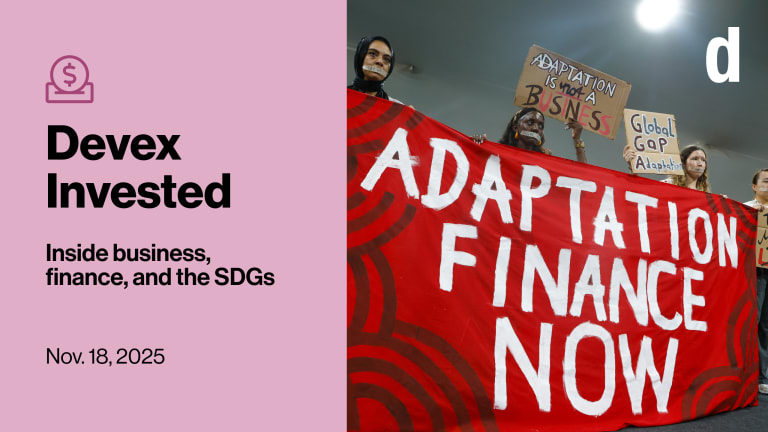
African leaders have descended on Washington, D.C., this week for the U.S.-Africa Leaders Summit, as the United States looks to reframe its relationship with African countries. Central to that goal is refocusing the relationship on issues of business, trade, and investment.
“We're moving into this space where private sector-led economic development is at the front and center of what our engagement on the continent is going to be going forward,” Witney Schneidman, a senior international adviser at the Covington & Burling law firm, tells Adva. “People aren't talking about aid. They're talking about investment. They're talking about trade, they want productive capital coming onto the market.”
This week Adva will be talking with policymakers, business leaders, and investors to learn about promising solutions to everything from food security challenges to digital connectivity — and see if these conversations do anything to change the often overblown risk concerns that many American investors and companies have about African countries, a complaint we’ve heard often in the lead-up to the summit.
Stay tuned this week for more coverage, including a look at Prosper Africa, the U.S. initiative to bolster trade and news of expected announcements about a new digital Africa initiative, and more.
Read more: African leaders come to Washington as US tries to reset relationship
No fees, please
As avid Invested readers may remember, back in February we wrote about surcharges at the International Monetary Fund, an often overlooked but incredibly controversial source of revenue for the fund. Pressure is mounting on IMF to do something about the fees heavily indebted nations are paying for borrowing, something we saw a hint of at the last G-20 summit (buried in Article 32 of the statement). The U.S. House of Representatives passed a resolution on the issue, but now it’s clear it won’t get taken up by the Senate.
This is a preview of Devex Invested
Sign up to this weekly newsletter inside business, finance, and the SDGs, in your inbox every Tuesday.
“Though our surcharges amendment didn’t make it in, the fight for global debt relief is far from over,” Rep. Jesús “Chuy” García, a Democrat from Illinois who led efforts against the fees in the House, tells Devex. "I’ll continue urging U.S. Treasury to oppose IMF surcharges and other predatory fees.”
This all means countries in trouble are paying billions of dollars extra, at a time when they can hardly afford to. Hundreds of civil society groups and United Nations human rights experts, including U.N. High Commissioner for Human Rights Volker Türk, have also put in letters to IMF chief Kristalina Georgieva asking for the suspension of the surcharges. Critics say Georgieva has been silent on the issue.
IMF’s executive board, as part of a regular review, discussed the surcharges Monday, including the merit of potential changes to the policy. But views continue to diverge, Shabtai has learned. We'll let you know if anything shifts.
Wish list
To start off 2023, we’ll be publishing a development finance wish list in Invested — and we need your help. What would you like to see happen in development finance next year? Some big new project? More use of a certain financial instrument? Regulation? Let us know via invested@devex.com.
Swap meet
In a bid to boost their lending capacity, two regional development banks have signed a $1.5 billion swap agreement. The move by the Asian Development Bank and the Inter-American Development Bank is an example of innovation in the development finance space that could get more money to countries in need by helping the anti-poverty lenders diversify their portfolios and shore up their credit ratings.
The deal, announced Monday, comes nearly two years after the banks started a trial run on such swaps. A recent report by the Group of 20 major economies suggested ways for banks to increase lending without hurting their high credit ratings, and there is ongoing pressure for the banks to optimize their balance sheets, particularly given the global economic slowdown and issues such as heavy debt burdens hitting many low- and middle-income nations.
ICYMI: US treasury secretary asks World Bank to think bigger and lend more
Crypto crash
At the start of the year my colleague Stephanie Beasley wrote about how this could be a big year for crypto philanthropy. But as she now writes, that bubble may have burst.
The collapse of cryptocurrency exchange FTX, founded by Sam Bankman-Fried, who was arrested Tuesday, has led to a major shake-up of the crypto market, and the assets seem increasingly risky and volatile. Some nonprofits that accept crypto donations expressed worries — but they’re continuing to engage. Stephanie has details on exactly why they’re staying in the game, despite the apparent downward spiral.
Read: Has 2022 been a bust for crypto philanthropy? (Pro)
+ Not yet a Devex Pro member? Start your 15-day free trial of Pro today to read the piece.
Living on credits
You’ve no doubt heard about carbon credits as a means to help fill climate finance needs. But with the United Nations Biodiversity Conference, or COP 15, underway, a new instrument — the biocredit — is being floated as a mechanism to finance conservation and restore biodiversity.
Your next job?
Senior Manager, Food and Forests
Ceres
$86,000 - $90,000 (annual gross)
United States (Remote)
What is a biocredit? A new kind of financial asset that represents a unit of biodiversity that can be measured and traced and then sold. The majority of the revenue then goes to Indigenous people and local communities. But the nascent instrument needs to be careful to avoid some of the challenges the carbon credit markets have faced, according to the International Institute for Environment and Development and the U.N. Development Programme, which recently studied some new biocredit efforts.
DevExplains: What’s next for carbon credit markets?
This one’s for the GFANZ
GFANZ, the global alliance through which hundreds of financial institutions representing more than $130 trillion in assets under management agreed to reach net-zero emissions, took another hit last week.
Vanguard, the second-largest global money manager, which had committed to achieving net-zero carbon emissions by 2050, resigned from the Net Zero Asset Managers initiative, which is part of GFANZ. The firm said it did so to provide clarity to investors. But it also comes against a backdrop of Republican attacks on financial institutions that members of the party say are anti-fossil fuel.
Meanwhile, at COP 15 a group of institutional investors announced Nature Action 100, a new initiative focused on investors driving action on nature-related risks in companies they own. But given the struggles of GFANZ over the past year, it’s hard not to cast a hard look at those initiatives.
What we’re reading
DevExplains: Why COP 27’s loss and damage fund is the new battleground. [Devex Pro]
The cautionary tale of Ghana’s slide into debt distress, and what it tells us about the growing crisis. [Bloomberg]
‘Cooperation rather than aid’: How Japan plans to spend $30 billion in Africa. [Devex Pro]









